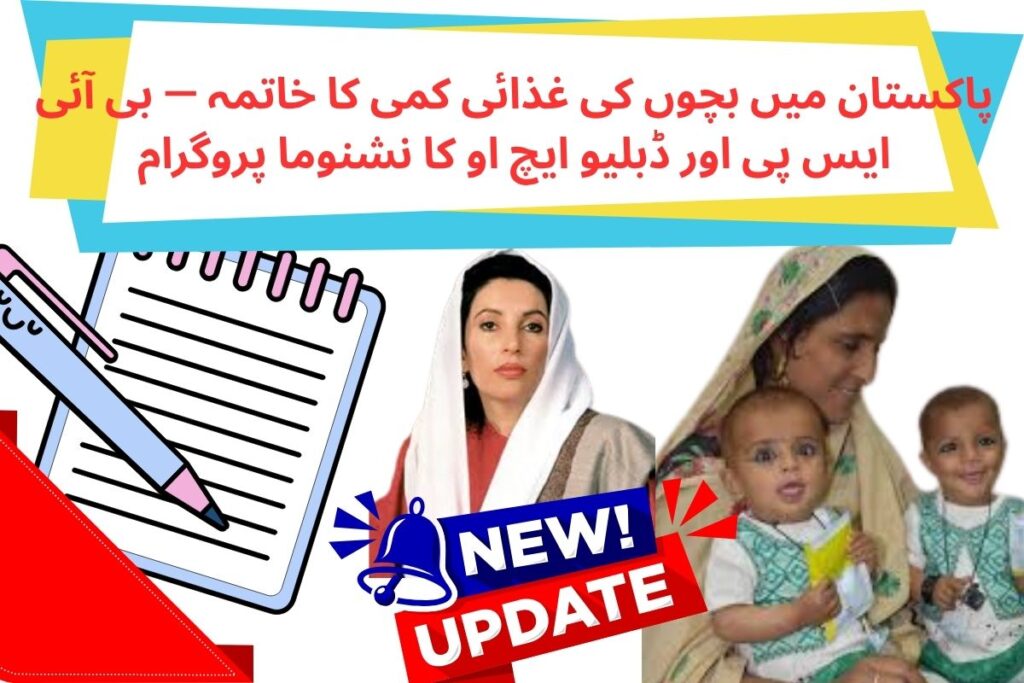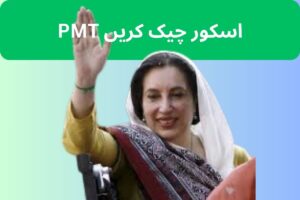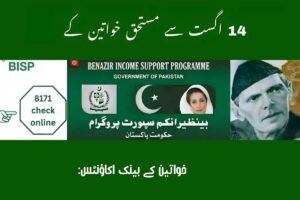Malnutrition in children is a major public health issue in Pakistan. It affects millions of kids under five years old. It can stunt growth, weaken immunity and limit the potential of Pakistan’s younger generation.
In order to combat this crisis, Benazir income support programme (BISP), has partnered up with World Health Organization in order to expand Nashonuma — a targeted health-and-nutrition initiative aimed at improving the wellbeing of mothers and their children throughout Pakistan.
This collaboration provides critical medical care and nutrition education to the most vulnerable families through a growing network Nutrition Stabilization Centres (NSCs).
Understanding Malnutrition Crisis
Malnutrition isn’t always visible. Although extreme cases of malnutrition may be visible as starvation in some children, the majority suffer silently through stunted growth and frequent illnesses, along with poor cognitive development.
In Pakistan, about 40% children under the age of five are stunted and many others suffer from wasting. These children are at grave risk of dying without treatment.
The first 1000 days of life, from conception until a child’s 2nd birthday are especially important. A child’s health and education can be irreversibly affected by poor nutrition in this time period.
What is the Nashonuma Programme
Nashonuma is a nutrition and health programme that supports:
- Pregnant women
- Breastfeeding mothers
- Children under two
The primary goal of the program is to prevent malnutrition and treat it early. The key services include:
- Cash incentives to encourage regular health checks-ups
- Specialized nutrition food for mothers and children
- Treatment for malnourished children in NSCs
- Education and counseling about nutrition, hygiene and infant care
Nashonuma breaks the cycle of poverty and malnutrition by supporting families at a critical developmental stage for a child.
The Nutrition Stabilization Centres (NSCs).
The Nashonuma program is centered around 169+ National Support Centers, located in hospitals and clinics across the country. These centers are staffed with medical professionals including doctors, nutritionists and nurses.
- Evaluation & Admission: Children showing signs of severe malnutrition will be evaluated and admitted.
- Inpatient care: Treatments include therapeutic feeding, medication, and hydration.
- Support to Mothers: Mothers are provided with nutritional advice and food while they remain with their children.
- Discharge and Follow-up: Families receive ongoing support after the child has recovered to prevent a relapse.
- Links to BISP Benefits Families can access ongoing financial and nutritional assistance.
These centers do more than save lives. They empower families by providing them with the knowledge and tools they need to maintain long-term health.
A powerful model: Conditional cash transfers (CCTs).
Nashonuma’s Conditional cash transfer (CCT) system is what makes it so effective. Families only receive financial incentives when they reach certain health milestones.
- Attending prenatal checkups
- Take your child for growth monitoring, vaccinations and other medical procedures
- Attending educational health sessions
This approach encourages families to engage with healthcare services consistently, while also easing their financial burden. It ensures accountability and a long-term effect.
Impact in Numbers
The first phase of Nashonuma is both inspiring and encouraging.
- More than 43,000 children suffering from severe acute malnutrition were treated in one year
- 98% recovery rate, exceeding global standards
- More than 120,000 mothers have received nutrition and counseling support
- Expanding the program will reach 80,000 children per year and launch 30 NSCs
These numbers represent actual families, healthier kids, and brighter prospects.
Community-Driven Approach
Nashonuma’s achievement is dependent on collaboration. The programme brings BISP together with WHO, UNICEF and WFP as well as provincial health departments. Together, they have built a network of support that includes:
- Community Health Workers Identifying malnourished children and rural areas
- Mobile Health Units Reaching underserved communities and remote areas
- Monitoring Systems Tracking outcomes and improving services
No child will be left behind with this combination of local expertise and global insight.
Take on root causes
Malnutrition can be treated, but that is only a part of the problem. Nashonuma works to prevent malnutrition by addressing the root causes.
- Food Insecurity and Poverty
- Low level of awareness about nutrition for children
- Limited Access to Clean Water and Healthcare
- Prenatal care and maternal health
campaigns of awareness and groups for mothers are among the many tools that families can use to create healthier homes.
Looking ahead: Building a Scalable Model
Nashonuma does not only solve an immediate health problem, it builds a blueprint to create a sustainable change. Its future objectives include:
- The NSCs are expanding to 199 locations across the country
- Early intervention to reach more teenage girls and pregnant mothers
- Incorporating climate resilient nutrition strategies for natural disasters
- Include youth-focused educational modules in order to promote lifelong wellness
With every step, BISP, WHO, and other partners invest in Pakistan’s Future – one child, one family and one community at a given time.
FAQs
Who can apply for the Nashonuma Programme?
Children under two years old, pregnant women, mothers who are breastfeeding, and mothers of children aged less than two are all eligible.
Are services at NSCs completely free?
All services, including food, treatment and education, are free to eligible families.
What are the signs that my child may be malnourished?
Look for extreme thinness, swelling of the feet, lack of energy or poor weight gains. Community health workers are able to assess your child and refer you directly to a NSC.
Final Thoughts
Nashonuma provides more than nutrition–it is a lifeline to thousands of Pakistani families. By combining cash assistance with quality healthcare, community outreach and education, BISP, WHO and other partners give vulnerable children a chance to thrive.
Nashonuma, with continued support and expansion has the potential to transform child health in Pakistan –and serve as a role model for other nations facing similar challenges.






